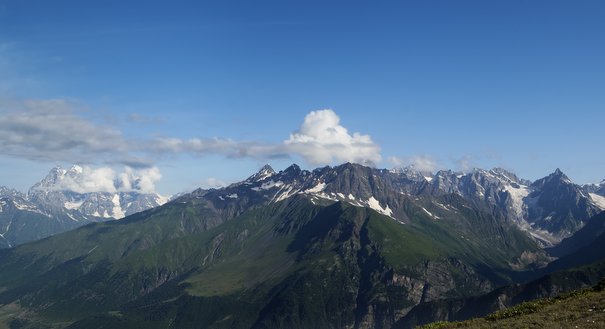David Rothkopf
{
"authors": [
"David Rothkopf"
],
"type": "legacyinthemedia",
"centerAffiliationAll": "",
"centers": [
"Carnegie Endowment for International Peace"
],
"collections": [],
"englishNewsletterAll": "",
"nonEnglishNewsletterAll": "",
"primaryCenter": "Carnegie Endowment for International Peace",
"programAffiliation": "",
"programs": [],
"projects": [],
"regions": [
"North America",
"United States",
"South America"
],
"topics": [
"Political Reform"
]
}
Source: Getty
Is a Green World a Safer World?: A Guide to the Coming Green Geopolitical Crises
The decades-long oil wars might be coming to an end, but there will be new types of conflicts, controversies, and unwelcome surprises in our future.
Source: Foreign Policy

The decades-long oil wars might be coming to an end as black gold says its long, long goodbye, but there will be new types of conflicts, controversies, and unwelcome surprises in our future (including perhaps a last wave of oil wars as some of the more fragile petrocracies decline). If anything, a look over the horizon suggests the instability produced by this massive and much-needed energy transition will force us to grapple with new forms of upheaval. Here's a guide to just a few of the possible green geopolitical tensions to come.
1. The Green Trade Wars
One source of international friction is far more certain to be a part of our energy future than many of the new technologies being touted as the next big thing. Consider the new U.S. approach in the energy and climate bill recently passed by the House of Representatives, which contains provisions for erecting trade barriers to countries that do not adopt measures to limit emissions. Proponents say these are necessary to reduce the chances of companies relocating to countries with lower emissions standards in order to get an unfair competitive edge. Such tariff regimes are also seen as keeping corporations from relocating to places where climate laws may be more lax, such as China.
Green protectionism is already a growth business. When the European Union considered restricting entry of biofuels based on a range of environmental standards, eight developing countries on three continents threatened legal action in the fall of 2008. In fact, there is a long tradition of such disputes (dolphin-safe tuna, anyone?), but the business community is worried that green protectionism could be a defining feature of international markets in the decades ahead. And of course, the prospect of green trade wars or even just opportunistic fiddling with trade laws to "protect" local jobs suggests a period of related international tensions, especially between developed countries and the emerging world.
2. The Rise and Fall of the Oil Powers
We're also going to witness the complex consequences of the simultaneous rise and decline of petrostates. First, the soaring price of oil -- which could skyrocket to $250 a barrel, according to some recent Wall Street estimates -- will fill their coffers. Sovereign wealth funds will grow fat again, and with the dollar likely to be weak for years to come, oil fat cats will be buying cheap U.S. assets and making American nationalists uncomfortable all the while.
Those fat cats still have a few good decades ahead of them. Twenty years from now, the world will still be getting at least three quarters of its energy from oil, coal, and natural gas. Today's energy infrastructure took years to develop, and even with revolutionary technological change, the energy mix can shift only marginally in the short term. So, as much as the West may wish to reduce its dependence on the likes of OPEC -- because it's not good to be too dependent on anyone, because oil is dirty and killing the environment, because Providence has seen fit to identify the world's most dangerous regions by locating oil beneath them, and because oil is a drug that has corrupted the character of many of its producing nations -- these countries will have considerable power for the foreseeable future.
But even as these states reach an apotheosis of power due to the price and scarcity of oil, the writing is on the wall. There is no return to oil once the supply peak has eventually been reached, and it is likely that the demand peak will come even before then. Burning oil at today's rate is just not a sustainable course unless you live inland or in far northern latitudes or own a company that manufactures hip waders.
So, the oil states will be rich, influential, and, paradoxically, in decline. The forward-looking among them might use the time they have to plan, to hedge their bets. But the slow death of the oil economy will undoubtedly lead to flare-ups as social pressures translate into political fractures and opportunistic politicians cling to wealth the old-fashioned way -- by grabbing it from their neighbors.
Predicting just where these fractures will occur is difficult. But it doesn't take much imagination to conclude that a Russia dependent on oil exports but faced with declining demand, dwindling reserves, and an unprecedented demographic meltdown will feel diminished in ways that are likely to be dangerous for its neighbors. Or consider how oil's inevitable decline will impact the succession struggle in Saudi Arabia, and that's if the current structure hasn't already collapsed under the weight of the ruling family's mismanagement and neglect of its people. Economic powers with a geological death sentence on their heads are likely to be erratic. One way or another, they will make the rest of us feel their pain.
3. Aftershocks of the Coming Nuclear Boom
Sorry, Mike Grunwald (see page 130), there is simply no way to reverse the effects of climate change without much more broadly embracing nuclear energy. Not only is it essentially emissions free, scalable, and comparatively energy efficient, but just 1 metric ton of uranium produces the same amount of energy as approximately 3,600 metric tons of oil (about 80,000 barrels). It is a far more sophisticated and proven technology than virtually all of the other emerging alternatives. These facts have already led to a very real renaissance in nuclear energy, one that is concentrated in the energy-hungry developing world (more than two thirds of announced projects are in developing countries).
Unfortunately, nuclear power is also fraught with real and perceived risks. Plant-safety hazards are pretty minimal, if history is any indicator. However, two real issues loom. One is how to safely dispose of spent fuel, a dilemma still hotly debated by environmentalists. And another is how to ensure the security of the fuel at every other stage of its life cycle, particularly in comparatively cash-strapped emerging countries, which are often in regions scarred by instability and home to terrorist organizations with their own nuclear ambitions.
With each new program, the chances of a security breach increase. Nor is the danger of a bad actor diverting fuel to produce an atomic bomb the only nuclear nightmare we're facing. Radioactive waste could be used to produce a dirty bomb with devastating impact. And fiddling with weapons programs behind closed doors might be the greatest security risk of all.
Nuclear-weapons expert Robert Gallucci once told me that, considering these growing risks, a deadly nuclear terrorist incident was "almost certain." Such an event would have broad global aftershocks affecting areas as diverse as civil liberties and trade. Imagine, for example, trying to ship anything anywhere in the world the day after. To give just one example, only 5 percent of shipping containers today are subject to visual inspection in the United States. Pressure to make inspection absolute in the wake of a nuclear event could easily lead to the buildup of millions of goods at U.S. ports, driving up consumer-goods prices as market supplies dwindle.
A new nuclear nonproliferation treaty is already on the drawing board, but even as U.S. President Barack Obama works to fulfill his dream of a world free of nuclear weapons, it is already clear that the risks posed by old-fashioned national stockpiles are being eclipsed by those associated with small groups exploiting cracks in an increasingly complex worldwide nuclear infrastructure.
4. Water Wars and Worse
Today, 1.1 billion people don't have ready access to clean water, and estimates suggest that within two decades as many as two thirds of the Earth's people will live in water-stressed regions. It has become a new conventional wisdom that water will become "the new oil," as Dow Chemical Chief Executive Andrew Liveris has said, both because of the new value it will have and the new conflicts it will generate.
Ironically, the hunt for energy alternatives to replace oil could make the water problem much worse. Some biofuels use significant amounts of water, including otherwise efficient sugar cane (unlike rain-soaked ethanol giant Brazil, most sugar-cane producers have to irrigate). Similarly, the various technologies that are seen as essential to the clean use of coal are water hogs. Plug-in hybrid cars also increase water use because they draw electricity, and most types of power plants use water as a coolant. Even seemingly unrelated technologies, such as silicon chips (key to everything from smart-grid technologies to more efficient energy use) require a great deal of water to produce.
Many countries could begin to address this by working out schemes to charge for water, the single best way to grapple with this problem. Alternatively, they may build nuclear desalination plants that make saltwater drinkable. Neither course is perfect. A de facto privatization of water has occurred throughout the world, with low-income populations forced to purchase bottled water to avoid contamination, but even so, the ideal of the right to free water has held firm and governments have found it politically untenable to charge even nominal sums. And those nuclear desalination plants? As countries that have deployed this technology, such as India, Japan, and Kazakhstan, have found, they're bloody expensive, at hundreds of millions of dollars a pop.
5. The Great Lithium Game
In Asia, Europe, and the United States, people are getting excited about the electric car -- and for good reason. Electric cars will enable greater independence from oil and could play a significant role in lowering carbon dioxide emissions. But the major fly in the ointment for the electric car is the battery.
Many solutions are being considered, including "air" batteries that produce electricity from the direct reaction of lithium metal with oxygen. The most likely option for now, though, is the lithium-ion battery used in cameras, computers, and cellphones. Lithium-ion batteries offer better storage and longer life than the older nickel-metal hydride models, making them ideal for a space-constrained, long-running vehicle.
All this means that lithium is likely to be a hot commodity in the years immediately ahead. It so happens that about three quarters of the world's known lithium reserves are concentrated in the southern cone of Latin America-to be precise, in the Atacama Desert, which is shared by two countries: Chile and Bolivia. Other than these reserves and the Spanish language, the one thing these two countries have in common is a historical animosity, cemented by their late 19th-century War of the Pacific. Chile was able to cut off Bolivia's access to the sea, a maneuver that rankles bitterly in La Paz to this day.
Bolivia's lack of coastline could become an issue again if the two lithium powerhouses start jostling to attract investors. Competition between Bolivian and Chilean lithium mines and, potentially, over domestic production of lithium batteries could very well bring about a second War of the Pacific -- to say nothing of the huge environmental costs that lithium mining incurs. Any such tension could jeopardize U.S. efforts to adopt electric vehicles, as the United States already gets 61 percent of its lithium imports from Chile. China and Russia, which also hold significant reserves, would be poised to ride out and profit from such an event. Further, conflict between the two Latin American states would likely bolster the fortunes of batteries made from less efficient resources, such as those used in nickel-metal hydride batteries, or boost other technologies that use different substances with their own drawbacks. And in any event, the possibility of a regional lithium rush reminds us that whatever technologies take hold, demand will emerge for the scarce commodities on which they depend … and we know well where that can lead.
These are just a few, fleeting glimpses of the future, but many geopolitical ramifications of moving toward green energy are very much with us already. In India, anxiety among some in the business community is growing as the United States and China meet secretly and not-so-secretly to try to hammer out an agreement on climate change. It's fast dawning on some Indians that their government's tough stance (resisting mandated emissions caps and offering only to keep India's per capita emissions at or below the average emissions in developed countries) could effectively keep it from having a seat at the table when the core elements of a global deal are worked out in the conversation between the world's two leading emitters and a handful of others. Brazil has a very different view on where such talks should come out because it wants credit for its role as the world's largest absorber of carbon. Russia also has its particular stance, that of an energy provider, and, as with other countries in northern climes, global warming could increase Russia's tourism income, boost its agricultural output, and produce other economic benefits.
Add in the tensions associated with differing views on green protectionism, the shape of relevant international institutions, and the competition for resources, and you can easily see how this contentious climate conversation is going to increasingly reshape the world. And who knows which new technologies could make much of today's speculation moot?
The bottom line: A shift away from dirty old fuels is the only path toward reducing several of the greatest security threats the planet faces, but we must step carefully and avoid letting our optimism run away with us. By acknowledging that a greener world will hardly be devoid of geopolitical challenges and preparing accordingly, we may find a path to defusing our threats today, while largely avoiding the inadvertent drawbacks of desperately needed innovation.
Original article available at ForeignPolicy.com.
Reproduced with permission from Foreign Policy # 174 (September/October 2009) www.foreignpolicy.com. Copyright 2009 Washingtonpost.Newsweek Interactive LLC.
About the Author

Former Visiting Scholar
David Rothkopf was a visiting scholar at the Carnegie Endowment as well as the former CEO and editor in chief of the FP Group.
- How Bush, Obama, and Trump Ended Pax AmericanaIn The Media
- A Bigger ClubhouseIn The Media
David Rothkopf
Recent Work
Carnegie does not take institutional positions on public policy issues; the views represented herein are those of the author(s) and do not necessarily reflect the views of Carnegie, its staff, or its trustees.
More Work from Carnegie Endowment for International Peace
- How Far Can Russian Arms Help Iran?Commentary
Arms supplies from Russia to Iran will not only continue, but could grow significantly if Russia gets the opportunity.
Nikita Smagin
- Is a Conflict-Ending Solution Even Possible in Ukraine?Commentary
On the fourth anniversary of Russia’s full-scale invasion, Carnegie experts discuss the war’s impacts and what might come next.
- +1
Eric Ciaramella, Aaron David Miller, Alexandra Prokopenko, …
- The Kremlin Is Destroying Its Own System of Coerced VotingCommentary
The use of technology to mobilize Russians to vote—a system tied to the relative material well-being of the electorate, its high dependence on the state, and a far-reaching system of digital control—is breaking down.
Andrey Pertsev
- Indian Americans Still Lean Left. Just Not as Reliably.Commentary
New data from the 2026 Indian American Attitudes Survey show that Democratic support has not fully rebounded from 2020.
- +1
Sumitra Badrinathan, Devesh Kapur, Andy Robaina, …
- Trump’s State of the Union Was as Light on Foreign Policy as He Is on StrategyCommentary
The speech addressed Iran but said little about Ukraine, China, Gaza, or other global sources of tension.
Aaron David Miller











